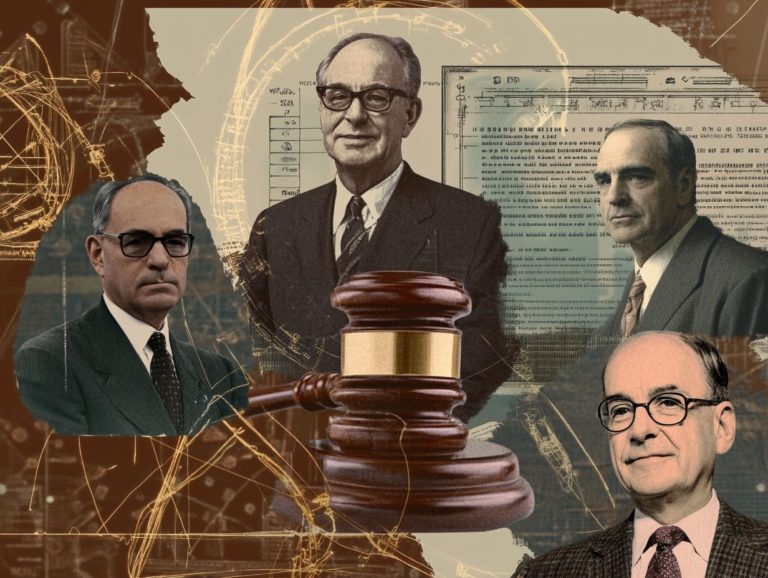The Role of Non-Disclosure Agreements in IP Litigation
Non-Disclosure Agreements (NDAs) are vital for keeping important information safe, particularly in the intricate world of intellectual property (IP) litigation.
As you navigate the business landscape, where proprietary ideas and innovations are paramount, understanding the details of NDAs becomes essential.
This article explores the various types of NDAs, their significance in IP cases, and how they protect intellectual property.
You ll also find insights on legal remedies available for breaches, along with common challenges encountered in enforcement and best practices for drafting effective agreements.
Jump in now to discover how to navigate the exciting world of NDAs in IP litigation.
Contents
- Key Takeaways:
- Types of NDAs
- The Use of NDAs in IP Litigation
- Enforcing NDAs in IP Litigation
- Challenges and Limitations of NDAs in IP Litigation
- Best Practices for Drafting NDAs in IP Litigation
- Frequently Asked Questions
- What is the role of non-disclosure agreements in IP litigation?
- Why are non-disclosure agreements important in IP litigation?
- Are non-disclosure agreements enforceable in IP litigation?
- What happens if a party violates a non-disclosure agreement in IP litigation?
- Can non-disclosure agreements be used in all types of IP litigation?
- Do non-disclosure agreements expire?
Key Takeaways:

NDAs are crucial in protecting intellectual property in IP litigation, as they prevent valuable information from being shared and used by competitors.
Mutual NDAs offer equal protection to both parties, while unilateral NDAs only protect one party’s confidential information.
Enforcing NDAs in IP litigation can lead to legal remedies for breach, but it is important to carefully draft and include key clauses to avoid potential challenges and limitations.
What is an NDA and Why is it Important?
A Non-Disclosure Agreement (NDA) is a legally binding contract designed to protect sensitive information shared between parties in business relationships, ensuring confidentiality of trade secrets.
This document establishes clear guidelines for handling confidential information and lays the groundwork for trust in various professional contexts, from employee onboarding to mergers and acquisitions.
Understanding the importance of NDAs can profoundly shape the dynamics of your business negotiations and partnerships.
By clearly defining what qualifies as confidential information, an NDA instills a sense of security and minimizes the risk of information leaks that could jeopardize competitive advantages.
Various scenarios necessitate NDAs, such as during employee onboarding, where new hires often gain access to sensitive company information early in the process.
If a party breaches the NDA, the consequences can be substantial, ranging from financial penalties to damaged business relationships.
The legal recourse available ensures that the interests of all stakeholders are protected, encouraging a stronger commitment to uphold confidentiality and integrity in your business dealings.
Types of NDAs
Understanding the details of various types of Non-Disclosure Agreements (NDAs) is crucial for creating enforceable agreements that align with your business interests and confidentiality requirements.
These agreements primarily fall into two categories: unilateral and mutual NDAs.
Mutual vs. Unilateral NDAs
Mutual and unilateral NDAs are two essential approaches to confidentiality agreements, each designed to address specific needs in protecting sensitive information and trade secrets.
A mutual NDA is beneficial when both you and the other party plan to share confidential information. This fosters a collaborative atmosphere, particularly in joint ventures or partnerships, where both sides have a vested interest in keeping things private.
For example, if your company teams up with another to develop a new product, a mutual agreement ensures both parties trade secrets remain safeguarded.
On the other hand, unilateral NDAs work well for situations where only one party is sharing sensitive information. For instance, consider a startup presenting its groundbreaking technology to potential investors. In this case, the investor is bound to maintain confidentiality regarding the startup s proprietary details, effectively shielding the young business s vital information.
Understanding the implications of these agreements is vital for anyone aiming to protect intellectual assets.
The Use of NDAs in IP Litigation

In the realm of intellectual property (IP) litigation, Non-Disclosure Agreements (NDAs) play a crucial role. They create enforceable contracts that safeguard your sensitive innovations and ideas, and understanding the role of the internet in IP litigation can provide essential legal recourse in case of a breach.
Are your ideas protected? Let’s discuss how NDAs can safeguard your innovations!
How NDAs Protect Intellectual Property
Non-Disclosure Agreements (NDAs) are essential tools for safeguarding your intellectual property. They ensure that sensitive information, such as trade secrets and unique methods, remains confidential and legally protected.
These legal contracts create a binding obligation for everyone involved to keep specific information private. This prevents unauthorized disclosure to outside parties and creates a vital barrier against potential theft or misuse of your valuable assets.
Tech companies often require partners, employees, and even potential investors to sign NDAs before sharing innovative designs or cutting-edge research.
In the pharmaceutical industry, NDAs are particularly crucial. They help keep drug formulations and clinical trial data secure, ensuring competitors can t exploit advancements before they hit the market.
By using NDAs effectively, you can protect your innovations and maintain a competitive edge.
Enforcing NDAs in IP Litigation
Enforcing Non-Disclosure Agreements in intellectual property litigation is essential for safeguarding your legal recourse against breaches. Understanding the role of IP litigation unlocks powerful legal remedies designed to protect your interests and those of any affected parties.
Legal Remedies for Breach of NDA
If a breach of your NDA occurs, you can take decisive action with legal remedies, including financial penalties and injunctions. These options provide enforceable agreements that protect your interests.
These remedies aim to compensate for any harm caused and emphasize the importance of confidentiality in your business relationships. Monetary compensation can reflect the actual losses you incur, ensuring you are made whole again.
Injunctions prevent further disclosure of sensitive information and stop ongoing violations. You might also consider specific performance, which compels the breaching party to adhere to the terms of the NDA, helping restore trust between the parties.
Ultimately, these legal options play a crucial role in safeguarding your proprietary information and discouraging others from engaging in similar misconduct.
Challenges and Limitations of NDAs in IP Litigation

While NDAs are essential for safeguarding sensitive information and trade secrets, challenges and limitations may impede their effectiveness in intellectual property litigation.
Potential Issues and Ways to Mitigate Them
Potential issues from NDAs can range from ambiguity and lack of clarity to enforcement challenges. You can effectively mitigate these risks through meticulous drafting and clear contractual obligations.
It’s crucial to understand the specific language in the agreement to prevent misunderstandings that might lead to disputes. A common pitfall is vagueness, which opens the door to interpretation and conflict.
Incorporating precise definitions and clear timelines is essential for reducing risks. Ensuring a mutual understanding of the confidential information being protected can significantly diminish misunderstandings.
When disputes arise, a well-drafted NDA facilitates straightforward legal recourse, allowing you to assert your rights effectively and minimize potential damages.
Best Practices for Drafting NDAs in IP Litigation
When drafting effective NDAs in intellectual property litigation, it s essential to adhere to best practices that safeguard confidentiality and establish legally enforceable agreements for your protection.
Meticulously crafting every detail enhances the strength of your NDA and fortifies your legal standing in any potential disputes.
Important Clauses and Considerations
Incorporating key clauses into Non-Disclosure Agreements (NDAs) is essential. These clauses ensure the agreement is legally enforceable and protects your sensitive information.
To ensure that your NDA fulfills its intended purpose, include essential clauses, such as precise definitions of what constitutes confidential information. This clarity defines what’s included in the agreement, ensuring you re fully protected!
Outline the obligations of each party. This establishes clear expectations for handling sensitive information. Also, specify the duration of the confidentiality obligation, as this can vary based on the nature of the information involved.
Detailing the consequences of a breach is equally vital. This acts as both a deterrent and a means of recourse. By addressing these considerations thoughtfully, you enhance the overall enforceability and effectiveness of the agreement, fostering a trustworthy environment for collaboration.
Frequently Asked Questions

What is the role of non-disclosure agreements in IP litigation?
Non-disclosure agreements, also known as NDAs, play a crucial role in IP litigation by protecting confidential information and trade secrets. They establish a legally binding agreement between two parties to keep specified information confidential and prevent it from being used or shared without permission, highlighting the role of settlement in IP litigation.
Why are non-disclosure agreements important in IP litigation?
In the context of IP litigation, NDAs are important because they allow parties to share sensitive information without fear of disclosure to competitors or the public. This encourages innovation and collaboration while protecting the IP rights of the involved parties.
Are non-disclosure agreements enforceable in IP litigation?
Yes, non-disclosure agreements are legally enforceable in IP litigation as long as they meet certain requirements. The agreement must clearly state the confidential information being protected, the purpose of the disclosure, and the time period for which the information must remain confidential.
What happens if a party violates a non-disclosure agreement in IP litigation?
If a party violates a non-disclosure agreement in IP litigation, the other party can take legal action to enforce the terms of the agreement. This may include seeking damages for any losses incurred due to the breach or obtaining an injunction to prevent further disclosure or use of the confidential information.
Can non-disclosure agreements be used in all types of IP litigation?
Yes, non-disclosure agreements can be used in all types of IP litigation, including copyright, trademark, and patent disputes. They are particularly useful in cases where the protection of sensitive information is critical, such as in understanding trade secret litigation.
Do non-disclosure agreements expire?
Non-disclosure agreements can have a specified duration or be indefinite, depending on the terms agreed upon by the parties. It is important to clearly state the time period for which the agreement will remain in effect to avoid misunderstandings or disputes in the future.
Need help drafting your NDA? Contact us today!






